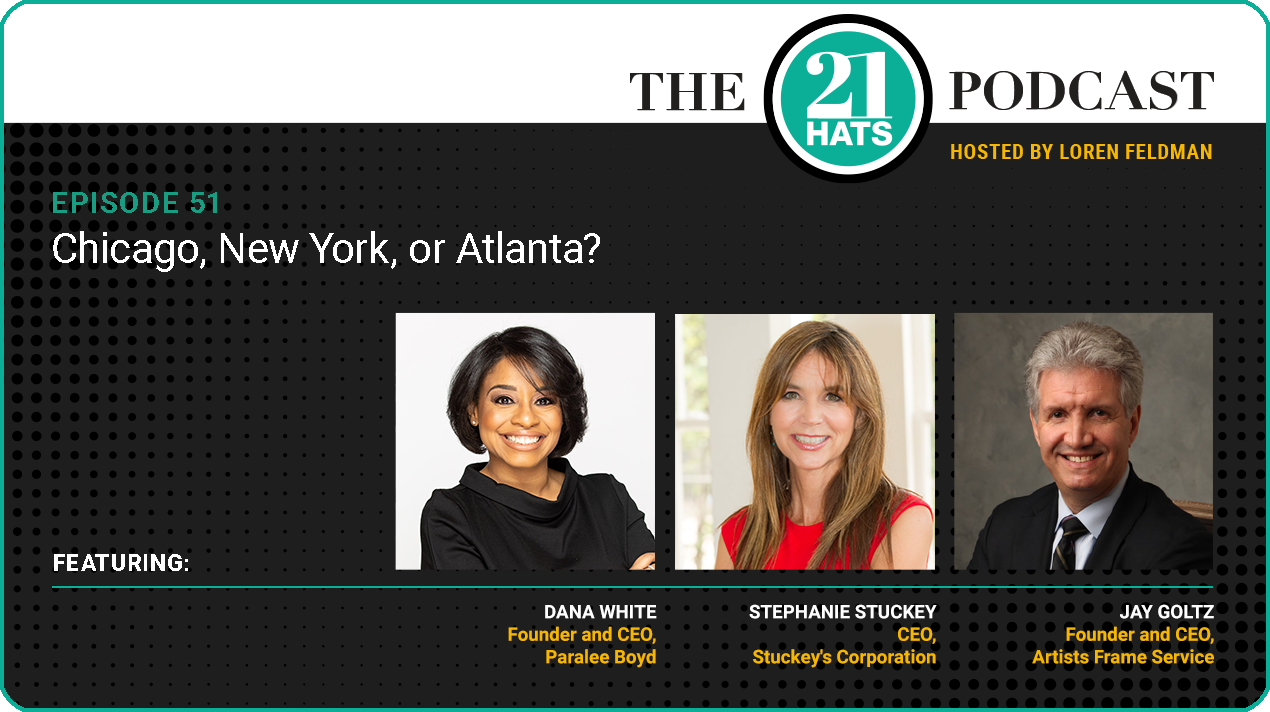New York, Chicago, or Atlanta?
Today’s Highlights: On a new 21 Hats Podcast, Dana White is looking to expand. Business owners recount their biggest mistakes. And how a small clothing maker uses Instagram as a non-stop focus group.
THE 21 HATS PODCAST
Episode 51: Chicago, New York, or Atlanta? A year ago, Dana White was questioning whether her business could survive the pandemic. This week, she says she’s looking seriously at expanding to another city: “I'd like to make a decision by the end of March, and I'd like to be opening or in the process of opening by this fall. I'm waiting to see how the vaccine does.” Dana also talks about her experience with venture capitalists who seem to be telling her, “We’ll be happy to give you money—as soon as you don’t really need it.” Plus: Stephanie Stuckey explains her team’s recent three-hour debate about whether Stuckey’s should sell the road trip or the pecan? And Dana, Stephanie, and Jay Goltz discuss Clubhouse, the new social media platform. Is it just a time suck, or does it offer real value to business owners?
You can subscribe to The 21 Hats Podcast wherever you get podcasts.
MANAGEMENT
Alex Bridgeman, host of the excellent podcast Think Like an Owner, asked business owners to send him their biggest failures so he could share them anonymously. He got some interesting responses:
“Biggest failure would probably be surprising someone with critical feedback or firing them without having hard discussions first. Being a coward about having discussions that are going to be confrontational.”
“Not realizing that employees had been stealing from the cash register in our store systematically to the tune of at least $40K until I let them go for other reasons. I still don't know for sure who was doing it. I just know that they are gone now."
“Didn't tap a [home equity line of credit] for emergency cash before buying a business and had to sell our home to stay afloat when projections didn't pan out."
"I repeatedly gave a high-performing sales employee leeway after treating co-workers poorly (sharp words, blame, Herculean tasks on tight timelines). Both the former owner and my board told me to cut bait day one but I refused to do so...” READ MORE
MARKETING
Here’s how a clothing maker uses Instagram as a non-stop focus group: “If you send a direct message via Instagram to Story Mfg.—a clothing brand based in Brighton, U.K.—you’ll likely get a response from one of its two founders, Saeed Al-Rubeyi or his wife Katy Al-Rubeyi. If you shoot the brand an email, Mr. Al-Rubeyi will likely answer you directly. The couple employ just a handful of other people, which partly explains this hands-on approach to customer service, but it also reflects their commitment to transparency when it comes to their production and business practices. On Instagram, Story regularly shares with its over 90,000 followers everything from previews of upcoming parkas to behind-the-scenes photos from the dye-houses it uses in India and even mock-ups of scrapped designs.”
“As a startup, Story didn’t have a backstory or, at that point, even a finished product. The posts and documentation of in-progress samples let the couple get supporters excited ‘before we actually [had] something to show them,’ said Ms. Al-Rubeyi.”
“A couple years ago, Mr. Al-Rubeyi said, if they’d post a photo of an in-production jacket and the reaction was tepid, they might scrap the design. Now that Story’s fans mostly trust the couple and the Al-Rubeyis pose more general questions rather than asking for specific product-by-product feedback.”
“Jake Regele, 22, a computer science student living in New York ... said that the approachability of the founders makes him feel like part of the label and not just a random consumer. Mr. Regele prides himself on owning nearly every item from the brand’s first official collection in 2015.” READ MORE
THE 21 HATS CONVERSATION
Does an ESOP make sense for your business? Jim Kalb has implemented an ESOP at Triad Components Group. Jeff Taylor implemented an ESOP at Crafts Technology. And Jay Goltz of the Goltz Group is interested but has lots of questions. Join us TODAY at 3 ET for a no-holds-barred webinar conversation about the pluses and minuses of employee ownership. Bring your own questions! REGISTER HERE
THE ECONOMY
U.S. manufacturing activity has hit a three-year high: “Timothy Fiore, chair of the ISM manufacturing survey panel, said the survey shows that a recovery is ongoing as manufacturers find ways to deal with supply-chain shortages and lingering pandemic issues such as short-term shutdowns at some plants to sanitize facilities. Manufacturers are also benefiting from a shift in spending, with Americans spending money on homes and other projects rather than going out to restaurants or risking shopping indoors, Fiore said.”
“‘They are buying all kinds of items that the manufacturing economy builds,’ he said. ‘As long as parts of the services sector are shut down, Americans are spending on hard goods.’” READ MORE
STARTUPS
A Chicago venture firm has raised $63 million to back seed-stage startups located anywhere but Silicon Valley: “Chicago Ventures (which is based in Chicago, where else?) has a very specific set of criteria when it looks to back companies. For one, as mentioned, it not only wants to back seed-stage startups, it usually leads those rounds. The firm is targeting 25 investments out of its new fund with an average check size of $1.5 million to $2 million. As evidence, it has so far backed 11 companies out of this third fund, leading 10 of those rounds. The startups include CognitOps, CoPilot, Forager, Interior Define, NOCD, OneRail, PreFix and Ureeka. The firm also is focused on investing in companies located out of the traditional hotspots of Silicon Valley and New York.”
“Six of its most recent investments were in Chicago-based startups, two in Austin (where it recently opened an office), one in Orlando, Florida, and one in Los Angeles.” READ MORE
HUMAN RESOURCES
Young workers are using TikTok to talk about mental health issues: “Twenty-three-year-old Londoner Max Selwood has a popular TikTok account, but not the kind you might expect. Unlike the dance trends and cooking how-tos that blew up on the platform in 2020, Selwood’s videos focus on a less fun – but also popular – subject: mental health. Selwood, who has anxiety, depression and obsessive-compulsive disorder (OCD), posts clips about social anxiety, mood changes, toxic masculinity and more. He first started posting about mental health on Instagram about three years ago, but began posting on TikTok not long before the start of the coronavirus pandemic.”
“According to a 2020 survey of 1,000 Brits aged 18-65 by consumer data-research firm Attest, less than half said they had ‘good’ mental health, but three times as many Gen Z and millennials said they had ‘very bad’ mental health compared to older participants.”
“Social media is often associated with worsening mental health, so it’s somewhat ironic that young users are relying on these very platforms to subvert expectations around mental health.”
“Kimberly O’Brien, an industrial-organizational psychologist and professor at Central Michigan University, says that any employer that decided to bring up an employee’s social media posts about mental health would be risking a messy legal battle.” READ MORE
ECOMMERCE
The internet equivalent of window-shopping is becoming a thing: “In normal times, Amanda Ryczek window-shopped — wandering around with no intention to buy, but taking time to see new merchandise or thinking of what could be worn and where. As the Covid-19 pandemic shut down brick-and-mortar stores, the 27-year-old moved her habits online. ‘I’m definitely not going into stores in the present moment, and so, as far as going online, you go to the store’s website and in some weird way it’s almost like going to the store,’ Ryczek said. But instead of testing a lotion or feeling the fabric on a shirt, she’ll hit ‘add to cart’ — and then exit the window before checking out. The internet equivalent of window-shopping isn’t new. People have been picking out items and abandoning carts for years. But the pastime appears to have increased due to the coronavirus pandemic, as consumers are in need of something to do and less willing to shell out money.”
“The trend of mindlessly scrolling online, adding items to a cart and then abandoning them isn’t necessarily the worst thing for retailers, since they’re getting eyeballs on products and those could lead to potential sales, explained Dennis Hegstad.”
“His company, LiveRecover, helps e-commerce companies re-capture shoppers who’ve abandoned their carts by sending text message reminders to customers who get far enough into the checkout process to include a phone number.” READ MORE
OPINION
Brad Close, president of the NFIB, says big businesses are supporting a $15 minimum in order to crush small businesses: “A recent ad in the D.C. media captured one of the most concerning parts of the minimum wage debate. The message wasn’t unusual — a call for Congress to more than double the federal minimum wage from $7.25 an hour to $15 an hour. What was noticeable was the advertiser —Amazon. On this critical issue, big business appears increasingly willing to sacrifice small business, and lawmakers should realize it. A growing number of major corporations and their trade groups are backing the current legislative push to dramatically raise the federal minimum wage.”
“It’s framed as a matter of supporting workers, but while many big businesses are already paying $15 to all their workers, most small businesses cannot.”
“Passing a wage hike right now would also worsen the pandemic trend of many big businesses thriving while millions of small businesses suffer.” READ MORE
THE MORNING REPORT PODCAST
Would you prefer an audio version of the Morning Report? Subscribe by searching for The Morning Report Podcast wherever you get podcasts. Or:
CANNABIS
Seth Rogen is finally unleashing his weed business:





